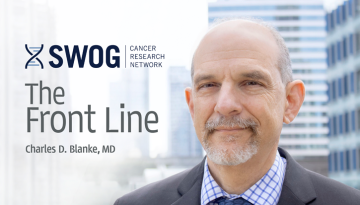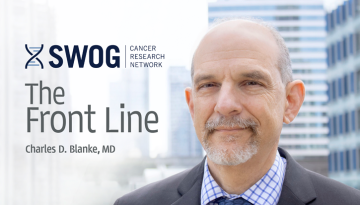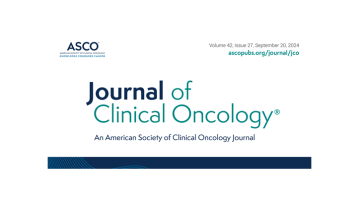Announcing SWOG's Vice Chair for DEII
It is almost a year ago now we posted a position description for a new SWOG leader – a vice chair for diversity, equity, inclusion, and professional integrity. Today, I’m thrilled that I get to say not only that we’ve identified a candidate for that role, but that we’ve filled it, with a truly outstanding leader – Dr. Don S. Dizon, currently chair of our digital engagement committee.
Dr. Dizon is director of the Pelvic Malignancies Program at Lifespan Cancer Institute, head of community outreach and engagement at the Legorreta Cancer Center at Brown University, and director of medical oncology at Rhode Island Hospital.
In his new role in SWOG, which he will step into immediately after the fall group meeting, he will provide strategic direction for leadership and staff in identifying and achieving DEI goals to make our group leadership and membership more diverse and to enroll more representative groups of participants to our clinical trials.
I’m not the only one thrilled by the news. Allison Caban-Holt, PhD, chair of our recruitment and retention committee, had the following opinion:
"This is excellent news! I am thrilled to hear someone with the experience and passion of Dr. Dizon is going to be at the helm of DEI in SWOG. The recruitment and retention committee, and our Diversity, Inclusion, and Belonging Strategic working group (DIBS), is looking forward to working with Dr. Dizon to discuss his DEI priorities as he begins conceptualizing what is needed for us to progress diversity, equity, and inclusion in SWOG."
Jo Horn, president and CEO of The Hope Foundation, co-chaired the search committee for the position. She said of the choice:
"The vice chair of DEI is crucial in leading SWOG’s strategy for including and treating all patients in the years ahead – and the scope of the position was continually honed until the skills and expertise required became clear. Dr. Dizon’s deep knowledge of both SWOG and the complex equity and inclusion landscape aligned perfectly. We’re thankful to him, to all of the applicants, and to the members of the search committee for their flexibility and constant reflection in forging ahead."
Don says it was his work around equity issues in the LGBTQ community, particularly around data collection issues, and his role in community outreach and engagement at Brown University that made him think seriously about applying for this role with SWOG. “Diversity and addressing inequity is actually a really big issue that we need to focus on, if we want to achieve equality within cancer care.”
He speaks of the work Pope Consulting carried out last year interviewing SWOG members and leaders for its DEI maturity analysis of the group, and says his impression of SWOG was mirrored in what Pope found. “I think we’re starting in a really good place,” in terms of SWOG’s DEI foundations.
Asked about his initial goals, he ticks off two: first, he wants to “bring transparency into SWOG processes, so people who are interested see themselves as legitimate candidates for any opportunity SWOG has.” On this front, he believes, SWOG has a great foothold, as all of its policies are open to the public.
His second goal builds on what we’ve learned from Pope Consulting’s analysis: “how do we identify these DEI principles within SWOG, and how can we operationalize them with measurable endpoints?”
A priority is to create a DEI commitment statement that explains SWOG’s DEI principles and directions. This must be followed by the iterative process of embedding the principles of that statement into our work.
“What I want to bring to SWOG in this role,” he says, “is a lot of the principles that underlie implementation sciences: engaging stakeholders, identifying interventions, measuring endpoints.”
This means integrating efforts by several SWOG groups and committees and ensuring those efforts build on each other. “It will involve working with committee leadership – the recruitment and retention committee, the patient advocate committee, and others – so we can see where we are right now, then prioritize by consensus what we should be doing.”
The themes of consensus and listening to SWOG members recur regularly when Don talks about his new role.
“One of the principles that underlies DEI initiatives is that every voice really does count. We may not all come to the table and sing Kumbaya,” he says, “and we may not all agree – that’s okay – it’s okay to have diverse opinions, but we need to work together with the understanding that mutual respect is assumed.”
Mutual respect is of course a central tenet of professional, collegial behavior, which brings me to the final “I” in “DEII,” which is for professional integrity. Dr. Dizon will also serve as SWOG’s ombudsperson – a neutral and confidential resource SWOG members with complaints about unethical professional behavior can turn to.
The vice chair role is an absolutely critical piece in SWOG’s efforts to become more patient centric. We will be more diverse, act more equitably, and be more inclusive. Dr. Dizon will help achieve all these goals, and I could not be happier with our choice to fill this role.
Please join me in welcoming Dr. Dizon as our first vice chair for DEII!
Other Recent Stories



